There is a general notion that crime, thriller and action films are targeted for men while romance films are for women. This prejudice has been significantlyshaken by the rise of a female fandom for genre films.
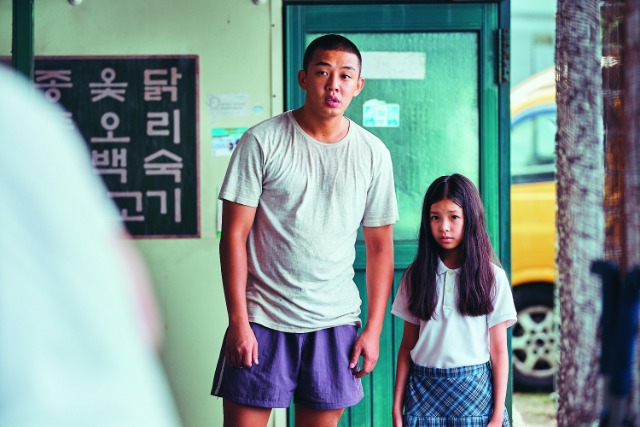
Director Hong Eui-jeong (far right) talks with actor Yoo Ah-in and other crew members on location for “Voice of Silence.” The movie earned her best new director at the 2021 Blue Dragon Film Awards.
“Asura: The City of Madness” (2016), a crime film directed by Kim Sung-su, and “The Merciless” (2017), a film noir by Byun Sung-hyun, achieved only mediocre commercial success, but both films generated unexpectedly eager fan support. Their fan groups, called “Asurians” and “Bulhandang Members” (from the movie’s Korean title, “Bulhandang”), respectively, conducted various activities online and offline to promote the movies. Notably, most of those who initiated these campaigns were women.
Challenging the conventional idea that women dislike genre films, more of these movies have recently been directed by women or featured female protagonists. In 2020, there was a surge of new women directors who presented debut films based on their own screenplays, including Sohn Won-pyung, Hong Euijeong and Park Ji-wan. Their work is rewriting the history of Korean film noir.
Disruption and Fear
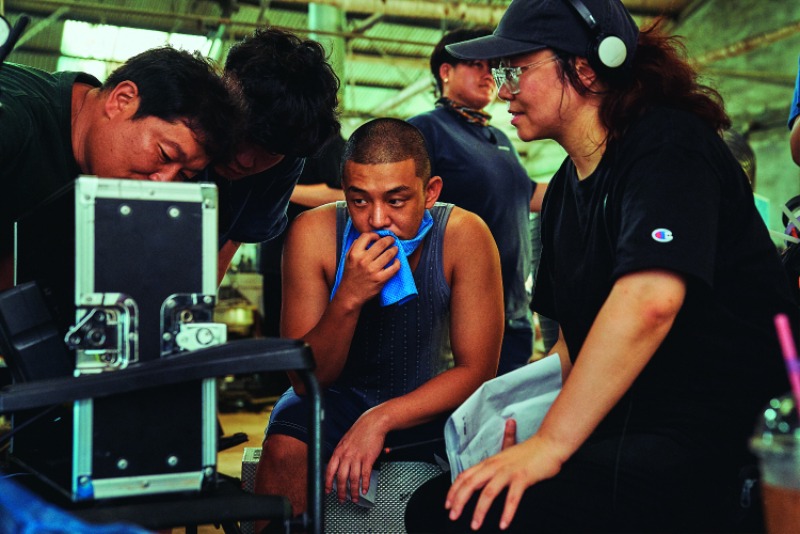
Yoo plays Tae-in, a subcontractor who takes care of dead bodies for a crime organization. He changes while looking after a kidnapped child.
Sohn Won-pyung, a novelist who won a young adult fiction award for her first book, “Almond,” stirred up talk about her extraordinary career when she startedshooting her debut feature film, “Intruder.” The movie observes a woman through the gaze of a man, but his first-person perspective is peculiarly unreliable. Astranger appears out of nowhere, claiming to be his younger sister who went missing in their childhood. The movie’s suspense is rooted in the difficulty of figuring out if she is truly his sister or an imposter. The man, Seo-jin, has been seeing a psychiatrist since his wife’s death in a traffic accident and is so unstable that it is hard to tell whether his trauma is real or imagined, or if he is a reliable character at all in the first place. The director deliberately detaches the audience from the first-person narrative by following the protagonist’s mental disarray.
The film’s handling of family dynamics is also unusual. In general, movies featuring atypical families try to persuade viewers of the validity of these family structures. “Intruder” s tension instead, by disclosing how powerless the real son is in competing with the alleged daughter to gain his parents’ trust, and portraying the disintegration of the family with the appearance of a suspicious person who claims to be one of their own. The director captures the fear caused by the unexpected disruption in the family’s daily routines, focusing on the protagonist’s psychological responses.
“Ghost Walk,” directed by Yu Eun-jeong, winner of the Audience Award at the 2018 Bucheon International Fantastic Film Festival, also explores a disoriented character. Hye-jeong, realizing she has become a ghost in the aftermath of a murder, returns to the past, one day at a time, to discover how she was killed, and eventually unravels the tangled relationships of all those involved. Unlike the dangerous and belligerent ghosts in conventional horror films, the ghost here awakens us to hope in life and concern for others.
Recent genre films are characterized by the way they abide by the genre’s rules but tweakthem slightly to givethe films a new twist.
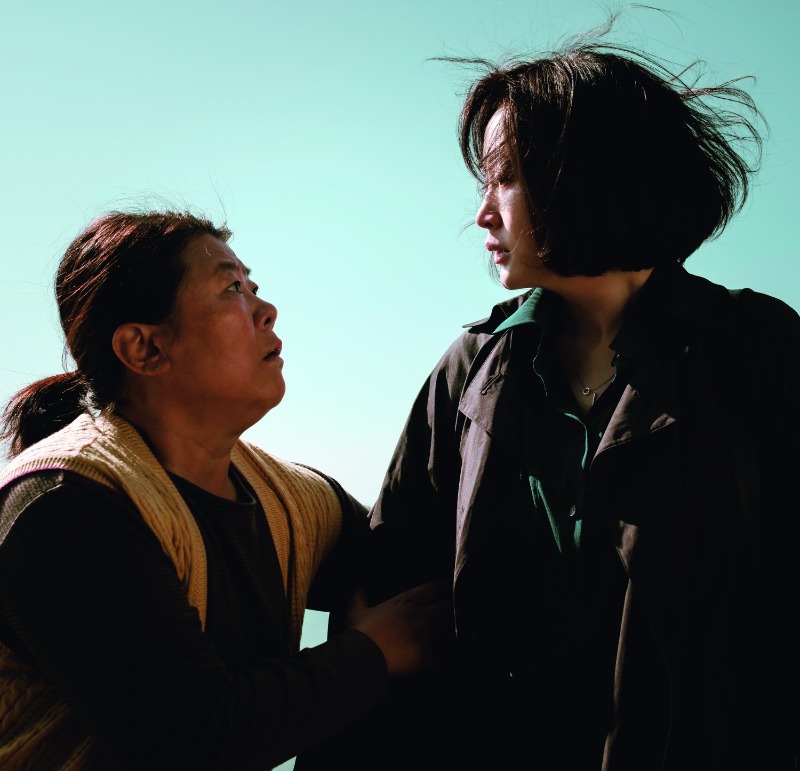
“The Day I Died: Unclosed Case” (2020), directed by Park Ji-wan, traces the mystery surrounding the disappearance of a girl, but the focus is on people empathizing with each other and trying to find meaning in life.
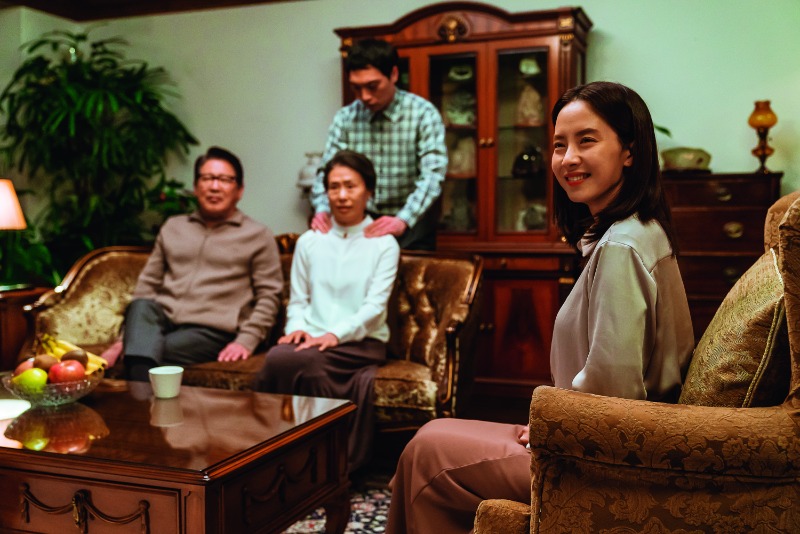
In director Sohn Won-pyung’s 2020 debut feature, “Intruder,” the patriarchal head of the household is rejected and alienated by his own family after they accept a woman claiming to be his sister who went missing 25 years ago.
New Styles
At the 2021 Blue Dragon Film Awards, the best new director award went to Hong Eui-jeong for “Voice of Silence.” As with “Intruder,” the main character is a man, but one who is depicted quite differently, with the narrative swiftly following his gaze as he reacts to an ever-evolving situation. Appraised by critics as “a crime film of a style never seen before,” this is the work of an ambitious new director keen on trying something new. The movie addresses murder and kidnapping without much violence, engaging the audience with its story alone while avoiding the clichés of crime films.
Tae-in (played by Yoo Ah-in) and his colleague Changbok are subcontractors who take care of dead bodies for a criminal organization. Unlike ordinary crime films, there’sno explanation as to why the gangsters commit murder or how the two men started to assist in the crimes. Instead, they are portrayed as ordinary workers diligently goingabout their jobs. The audience is drawn into the strange chemistry between them, forgetting about the nature of their work.
Crime is just a part of their everyday lives, like eating or sleeping. But their daily routine is suddenly disrupted as they find themselves stuck with a kidnapped child. Taein changes when forced to take care of the 11-year-old girl, and the relationship between them develops in an unexpected way. Overall, the film shines a spotlight on the absurd circumstances faced by the characters while enlivening the personal appeal and strength of each, maintaining a superb balance throughout the story.
“The Day I Died: Unclosed Case,” directed by Park Ji-wan, also deftly balances the entertainment value of the genre with cinematic meaning. The thriller traces the mysterious disappearance of a girl who seems to have jumped from a cliff into the sea on a stormy night, leaving a suicide note. Hyun-su, the detective investigating the case, is mentally unstable at first. As she follows the footsteps of the missing girl, however, she realizes how the girl struggled to stay alive, just like herself, and tackles the case not as a detective but as an individual who strongly identifies with the victim.
For quite a while, Hyun-su wonders if she should file the case as a missing person or a suicide. It’s her hesitation that adds depth to the story. While the thrill of hunting for clues and solving a case is an important part of any mystery film, “The Day I Died” shifts focus to the character’s inner world rather than the mystery itself. In sum, the movie is a thoughtful thriller that tries to make room for the spectacle of emotions by suppressing that which ordinarily defines the genre.
Querying the Genre
In this way, recent genre films are characterized by the way they abide by the genre’s rules but tweak them slightly to give the films a new twist. By artfully betraying expectations, they breathe fresh air into a category of film overrun with stale clichés. The works of the women directors discussed above pose questions about film noir itself. While these women are seemingly uninterested in offering the pleasures unique to the genre, they fun in a different way by injecting new perspectives.
Documentaries don’t necessarily show reality as it is. Instead, reality is transplanted into a cinematic structure and reorganized in ways that sometimes wielda stronger and more intense power than reality itself. This is precisely what happens with “People in Elancia,” directed by Park Yun-jin.
Elancia, the third game developed by the online game publisher Nexon, had a story that mixed Eastern and Western cultural elements through lovely graphics. Itattracted a throng of female users to the traditionally male-dominated online game market, and remained one of the most popular games for quite some time. However, its popularity gradually waned as Nexon’s other games, including Nexus: The Kingdom of the Winds (Korea’s very first online game), KartRider, MapleStory and Mabinogi, were opened in many other countries, played in e-sports leagues, or adapted for TV animations.
Park Yun-jin played the old game under the nickname “my-sister-jun-ji-hyun” (hence the film’s Korean title, “My Sister Jun Ji-hyun and I”) with a handful of other remaining users. The film started from the question, “Why do we still stay in this game?”
The movie starts by going back to the tumultuous late 1990s, when Korea was suffering in the aftermath of the 1997 Asian financial crisis. At a time when anxiety anddespair prevailed, Elancia reflected collective desires for a world where anyone could be or do anything. In the real world, hard work often went unrewarded and unfair situations occurred, but in the game world, rewards were granted according to time and effort invested.
Querying the Genre
In this way, recent genre films are characterized by the way they abide by the genre’s rules but tweak them slightly to give the films a new twist. By artfully betraying expectations, they breathe fresh air into a category of film overrun with stale clichés. The works of the women directors discussed above pose questions about film noir itself. While these women are seemingly uninterested in offering the pleasures unique to the genre, they fun in a different way by injecting new perspectives.
Macros and Hacking
The problem is that the utopia didn’t last long. As the developer stopped updating the game, leaving many bugs unaddressed, it became a lawless place where hackingwas rampant and all sorts of macros, programming inputs that automate tasks, were used. There was also an increase in malicious users who would strengthen theircharacters by unfair means or interrupt other ps. With illegitimate macros running the game even when most of the users had disappeared, Elancia became astrange world working on its own instead of being d and modified by users.
Demotivated to play or otherwise having nothing else to do inside the game, users would gather in its chat room. Over time, their conversations came to be all thatremained of Elancia. The game screen is now covered with a constant flow of text, like the traces of alienated users struggling to prove their existence.
THE REASONS THEY STAY
PEOPLE IN ELANCIA
Elancia, an MMORPG released by Nexon in 1999, once had more ps than any other game. But after years of neglect by its developer, it ended up becoming a “doomedgame.” The 2020 ary, “People in Elancia,” brings to light the reasons why its director Park Yun-jin and her fellow ps still love the game two decades later.

The poster of “People in Elancia.” In the 2020 ary, the director examines why her fellow users can’t just leave the game two decades after itbecame functionally inoperative.
Evidence of Existence
Even viewers with no knowledge of the game are drawn into the idea of this ary by the “doomed game.” “Doomed” (manghaetta in Korean) is a word often used in real life. Embittered by repeated frustrations in a low-growth society, many young people say with resignation, “I’m doomed in this life.” However, they still live, no matter how hopeless they feel their lives are. In this way, the word “doomed” may be an ironic declaration that they are still alive or want to be alive.
A small number of users continue to visit Elancia, which no longer has a system administrator. Talking with them, the director tries to capture the present moment oflistless youths in their 20s and 30s who are precariously holding out. The game’s ecosystem was destroyed by the infiltration of illegitimate macros, forcing users to accept what was imposed upon them instead of enjoying the game on their own terms – in a way similar to what many young people experience today in real life.
Loose Relationships
Just as they had no reason to stay in the game, they have no reason to leave it, either. In the virtual world, they listen to other people’s stories and sympathize with them, sometimes offering consolation. If there is a reason they have played the game for so long in the first place, it must be the other people who remain with them. These loose relationships keep them in Elancia, holding on to a world that could end at any time. The director interviews those users to deliver their opinions to the staff at Nexon. This doesn’t appear to be an effort to save the game, however. Rather, it may be the struggle of alienated individuals to restore their sense of self.
Just as they had no reason to stay in the game, they have no reason to leave it, either.
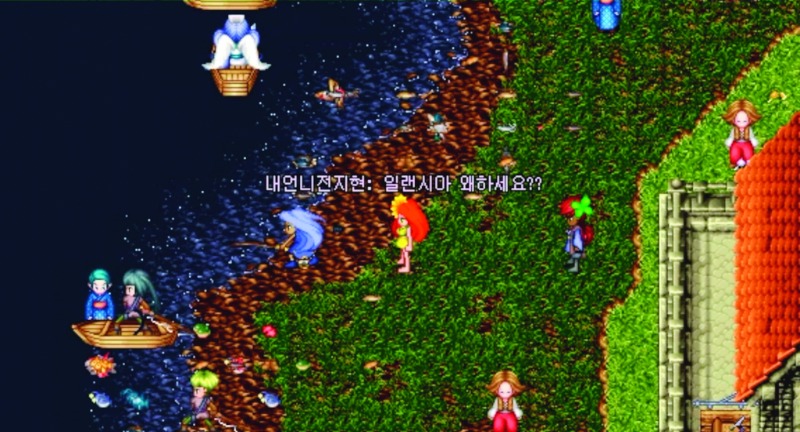
A screenshot from Elancia, Nexon’s MMORPG.

Director Park Yun-jin talks with other users of Elancia.
Kim So-huiFilm Critic